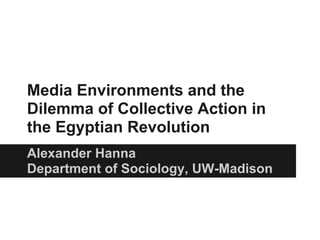
Egyptian Media's Role in Overcoming Collective Action Dilemmas
- 1. Media Environments and the Dilemma of Collective Action in the Egyptian Revolution Alexander Hanna Department of Sociology, UW-Madison
- 2. About me 4th year PhD student in sociology Background in computer science and math Son of Egyptian immigrants
- 3. My research agenda ● How people use various media to overcome collective action problems in authoritarian environments ○ e.g: Egypt, China ● Political elites and their followers in social media ○ Large-scale Twitter collections surrounding 2010, 2012 elections
- 4. Today's talk Media environments and the dilemma of collective action in the Egyptian revolution
- 5. Chronology of the Egyptian revolution (1/3) ● June 6, 2010: Death of Khaled Said ● Dec. 17, 2010: Self- immolation of Mohamed Bouazizi, Tunisia protests Image Source: http://www.guardian.co. uk/world/2011/jun/17/arab-spring-end-anyone- begin guess
- 6. Chronology of Egyptian revolution (2/3) ● Jan 14, 2011: Pres. of Tunisia, Ben Ali, steps down ● Jan 25: First major protests in Egypt ● Jan 27: Net turned off ● Jan 28: "Friday of Rage"
- 7. Chronology of Egyptian revolution (3/3) ● Feb 2, 2011: Net turned back on, Battle of the Camel ● Feb 11, 2011: Mubarak resigns, army assumes power
- 8. Dilemma of collective action People won't participate in collective action (like a protest) unless they have guarantees that others will. Otherwise, they will have no incentive to participate, will "free ride" on the contributions of others (Mancur Olson)
- 9. Examples of the dilemma of collective action ● Contributing to Wikipedia (a public good) ○ Why contribute to Wikipedia when others are going to do it? ● Prisoner's dilemma ● How to resolve? ○ Communication!
- 10. Egypt's political environment ● Over 60 years of dictatorial rule, and under colonial rule for much longer. ● Laws prohibiting protesting. ● How can people communicate for Image source: http://english.alarabiya. net/articles/2011/04/28/146997.html protests?
- 11. Bringing in the media environment ● Different types of media that compete for audience attention. ● In the US ○ TV: CNN, Fox, MSNBC ○ Newspapers: NY Times, Washington Post, Wisconsin State Journal ○ Radio: NPR ○ Internet: Facebook, Twitter, blogs
- 12. Egyptian Media Environment -- in transition ● Old media environment ○ State-controlled TV and newspapers control what people see, hear, and think ○ Nothing critical of the regime, all broadcasting to audience ● New media environment ○ Introduction of private TV, both regional and domestic ○ Private newspapers ○ Social media ○ Many different voices, audience can respond
- 15. Research question Can new media, like regional satellite television and social media, help activists overcome dilemma of collective action?
- 16. Example 1: Sherif Sherif hears about protests only on state TV. State TV says the protests will be small, filled with thugs and criminals.
- 17. Example 2: Nana Nana hears about protests in Cairo and Tunisia from al- Jazeera (AJ) and also hears state TV's story. AJ is supportive of the protests.
- 18. Example 3: Alaa Alaa watches AJ and state TV, and also communicates with his friends on Twitter and Facebook, seeing what they are going to do. Image source: http://en.wikipedia. org/wiki/Alaa_Abd_El-Fattah
- 19. Who is most likely to protest?
- 20. Methods of research 1. Network and textual analysis 2. Interviews 3. Content analysis of TV Why these methods?
- 21. Full survey results at www.iri.org/sites/default/files/2011 June 5 Survey of Egyptian Public Opinion, April 14-27, 2011_0.pdf
- 22. Data for network and textual analysis Dataset of over 12 million tweets collected on #jan25 and other Egypt keywords from Jan 25 to March 1 Need to identify who people are speaking to and what they are saying without having to read every single tweet
- 23. Network analysis ● Understanding who speaks to who ● Who is the most central? ● Are there particular groups of people who speak to each other constantly?
- 24. Textual analysis Who talks about going to protest?
- 25. Interviews Talking to people who used social media, watched different types of TV, and participated in the revolution on January 25 and 28. Looking at a variety of different cities - Cairo, Alexandria, Suez, Mahalla Planning to do this next year
- 26. Content analysis of TV Analyzing state TV and regional satellite TV for protesting framing and cues. vs.
- 27. Conclusion Need to better understand how people respond to media and how it affects how they participate in collective action.
